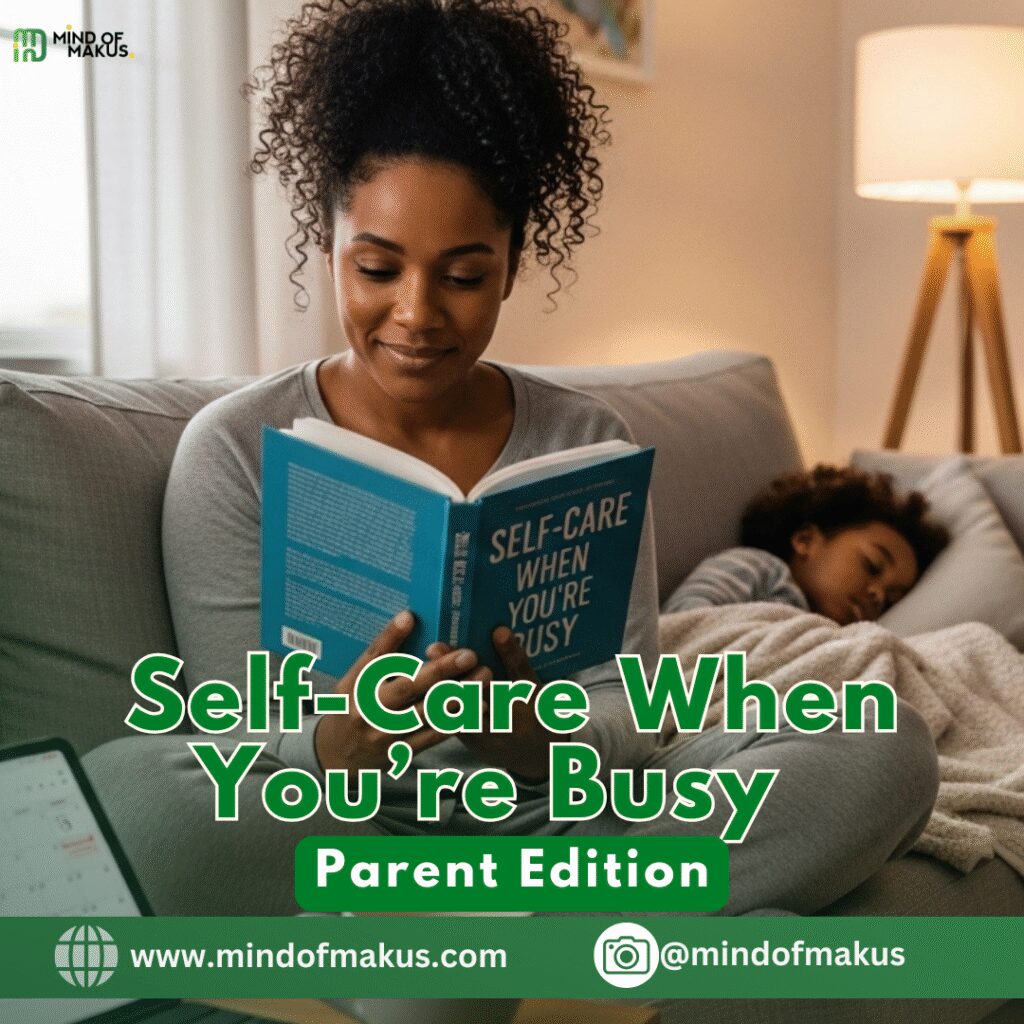Hello dear friend,
How are you doing today? I hope you’re well. Keeping up with your dreams and aspirations, fighting to embody the reality of all God has willed for you, well done.
Sometimes we wish to do what is ideal, but our circumstances make it such an arduous task that we can give up along the way.
Do not despair, my dear friend, in the matrix of time, responsibilities, relationships, and dreams, we can forget to care for our own selves. Let’s be honest — parenting and self-care don’t always mix easily. Between morning routines, school runs, deadlines, and never-ending laundry, the idea of taking time for yourself can feel like a luxury from another life.
But here’s the truth every parent needs to hear:
You can’t pour from an empty cup. Caring for yourself is directly related to the emotional well-being of your children.
Would you rather be kind and regulated or irritable and abusive?
Self-care isn’t selfish. It’s how you keep showing up — present, calm, and connected — for the people who need you most. The key is learning how to practice it in the middle of the busyness, not apart from it.
I was forced to my knees in the first year of being a mum, from fatigue and resentment rooted in telling myself I had no other options.
One day, someone mentioned that rest did not need to be earned; you could give yourself the permission to rest whenever you wanted, even though the chores were not done and the job list was not done.
It was a resounding moment in my life and quite life-changing because all my life I had borne the weight of showing up and performing at all times, so I didn’t know how to rest.
A lifestyle that is in direct contradiction to what God intended and continues to will for us. That’s what we are living. Constantly striving, stressing, and wondering why we are dropping like flies.


In this blog, we’ll explore practical, guilt-free ways to improve your self-care, even when life feels like a whirlwind.
1. Redefine What Self-Care Means
Self-care isn’t always spa days or long getaways (though those are wonderful when possible). For busy parents, self-care is anything that helps you feel restored — body, mind, or soul.
It could be:
● Taking five deep breaths before responding to your child.
● Listening to your favorite podcast during school drop-off.
● Saying no to that extra task that drains your peace.
👉 Self-care is not about escape; it’s about renewal. Speak to people in your support network and discuss what this means for you all.
When you redefine it this way, it becomes accessible — even on your busiest days.
2. Start Small and Make It Routine
One of the biggest barriers to self-care for parents is the belief that it requires extra time. The trick? Integrate it into your existing routines.
🕒 Try these mini self-care moments:
● Morning check-in: Before everyone wakes up, take two minutes to stretch and breathe. I started waking up a bit earlier to have a cup of tea and plan my day. Later, I started going to the gym, and this has helped me greatly, even during tough times.
● Me-time in motion: Turn chores into a mindfulness exercise — notice your breathing while folding laundry or washing dishes. Just notice your breathing, fast or slow; deep or shallow; hot or cold; what does the air smell like? Do you like how your home smells?
● Evening unwind: After bedtime, light a candle or enjoy a warm drink and a bath, wear something comfortable, dim the lights to create a relaxing atmosphere in your space, and turn on some music you love.
Small, consistent acts of care create big emotional shifts over time. These small things make a huge difference to our lives, and they are the most impactful over time.
Subscribe to My Newsletter
3. Manage Your Mental Load
Parents often carry invisible weight — remembering appointments, meals, birthdays, permission slips… the list goes on. This mental load can drain your energy even before the day begins.
To ease it:
● Delegate: Let go of the need to control everything. Share tasks with your partner, kids, paid support staff, or supportive friends.
● Use systems: Set reminders, lists, or apps to track what needs to be done. Many families have the reminder boards on the fridge or a family Google calendar to save important dates.
● Prioritize rest: When your brain says, “I can’t think anymore,” listen. Pause and do a brain dump on paper, and rest. Please pick it up another time.
💬 Tip: Your mind is not a storage unit. Free it up so you can actually enjoy the moments you work so hard to create.


4. Set Boundaries and Stick to Them
Self-care thrives with healthy boundaries put in place. Without them, you risk running on autopilot until burnout sneaks in, and you may not recover quickly from that. I have always taken the approach of prevention when it comes to health, and I hope you also adopt that.
Healthy boundaries could look like:
● Saying no to overcommitting.
● Setting “quiet hours” at home where everyone gets to rest or read
● Protecting your time — especially for sleep and recovery.
Remember: Boundaries are not barriers; they’re bridges to peace. They teach your children that caring for yourself is a sign of strength, not selfishness.
I once read about a family that chose to eat dinner together; however, the kids had to eat what was on the table, and the parents didn’t stand up from the dinner table to attend to any needs at that time. I found it quite admirable, knowing how persuasive young children can be.
5. Rest Without Guilt
Rest is a form of resistance in a world that glorifies busyness.
You deserve to rest because you’re human, not because you’ve “earned” it.
Try this:
● Nap when your kids nap (the dishes can wait).
● Unplug for an hour on weekends.
● Schedule a “no-plan day” once a month.
● Spend time with people who allow you to rest. A lot of times, we are surrounded by people who always need something from us, and we feel good about being needed.
The more rested you are, the more patient, creative, and present you’ll be — for yourself and your family.


6. Involve Your Kids in Your Self-Care
Children learn self-care by watching it. When they see you taking breaks, expressing emotions, or saying no respectfully, they learn to do the same. Start to let them see you happy, rested, refreshed, and comfortable. Normalise being a safe adult around your children.
Invite them into your self-care rituals:
● Take short walks together.
● Practice gratitude at dinner.
● Have a “quiet reading hour” as a family.
You’re not just improving your well-being — you’re modeling emotional intelligence and resilience for the next generation. You are giving your children a great inheritance.


Final Thoughts
Dear parent, you don’t need to wait for a vacation to care for yourself.
You can nurture your peace in the middle of the mess. Pray for the grace to see yourself as a priority, as a worthy beneficiary of love and care. Teach people how to care for you by modeling it. No material gift can take the place of an elevated sense of enjoyment from daily life. Hold this dear.
You can Support My Work
Start small, stay consistent, and give yourself grace. Every moment you choose yourself, you’re choosing a healthier, happier family too.
Remember: You deserve the same care you give so freely to others.
Until next time — stay warm, stay growing, stay loving, stay whole.
With love and light,
Amaka



